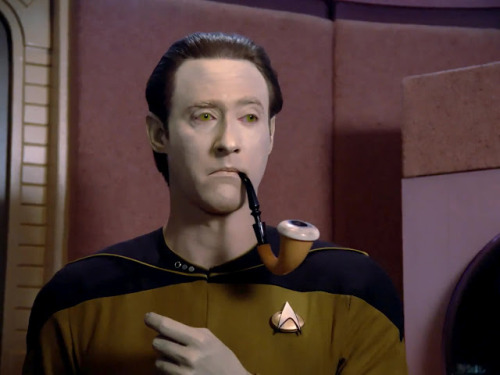"This is not a picture of a Data with a Pipe"
Lonely Among Us
So in the long short of it, I did the formal analysis. Here is the breakdown:
Exploration/Necessity: Two species apply to the Federation, Enterprise escorts them.
Alien Meet Up: Three groups! Atikins, Sellay, and some strange Energy Creatures
Crew Endangerment: Strange Energy Creatures begin to infect the crew!
Rules/Regulations: Troy and Data investigate
Crises Navigation: Captain infected and the crew steps in.
Reasoning: Mutiny?
Necessary Problem: Picard lost in the energy storm!
Trickery: Picard uses same methods as energy creatures!
Beneficial Resolution: Picard takes a well deserved rest, the aliens get to Parliament without further incident.
It all fit in nicely. However that was definitely not the most interesting thing about this episode.
Mystery!
"A mystery is only a mystery as long as it remains unsolved" -DataThis episode uses motifs used in detective fiction, mysteries, and film noir. Not only does it use these motifs to its advantage, but it uses a distinct set of coded themes that span the genre at its formation. It starts off with Picard mentioning perhaps the greatest detective to grace the pages of any book: Sherlock Holmes. Though Holmes is not the first detective (some give that date to Poe's "The Man of the Crowd" or Dupin), he is indeed the best. Data proceeds to start smoking a pipe and say "indubitably". This is just the start of the Data's shenanigans. Data then tries to solve everything with pure empirical analysis.
The nod to empiricism is what makes this episode so great; partially because the entity they are trying to find cannot be empirically detected by itself. The creature inhabits the ship and its crew like a ghost, but gives away nothing to the outward sense of detection. The show sets up a dynamic whereupon it highlights the failures of empiricism. However, Star Trek being Star Trek, it tries to solve this problem with a sort of transcendental empiricism supplied by Troi.
Troi has a scene where she hypnotizes Beverly Crusher (wow another nod to the 19th century with mesmerism). The outcome is Crusher telling us that there was an entity in her mind. Yet the most interesting outcome is what Troi says when she talks about the duality that she sense in humans. She is seemingly talking about Freud's "conscious / subconscious". It's strange that a counselor on a ship comprised of some of the brightest minds in the galaxy has to bring up the concept of duality--even stranger that she uses holistic terms of explaining it like some sort of psychology freshman smoking weed for the first time. Regardless, she mentions another duality that is caused by the alien and this brings up a good point. That Troi is able to sense something above what the realm of normal empirical sense can show (although if one of her senses is to sense emotion, is that empiricism?...uhh). So the show brings in some transcendentalist ideas in the middle.
Gothic!
"Are you aware that everyone is behaving strangely?" -PicardThis episodes shows a more film noir or gothic side of Star Trek. Throughout the episode the enterprise is much darker. Aliens plot to murder each other. And a creature is infecting the crew. Furthermore that entity causes memory loss. The episode is very film noir in aspects like its lighting and its dangerous mystery. There are no femme fatales or insurance scams, but there is a talk of mutiny. The uncanny is heavily prevalent in this episode in the form of the crew mates who are themselves but not, and the unknown sources of the ships malfunctions. Throw in the death of the engineer Singh, and you have yourself a murder mystery of sorts. Picard also, while possessed by the energy creature, gives the big info dump that ends many who-dunnits.
Conclusion
Star Trek is a show that is almost constantly trying to root itself in literary traditions. There is a very firm classical aesthetic that goes into the show. It is strange, but in some ways it is a show that has science fiction trying to validate itself by being in communication with classic literature. Its fitting that Data would be the empiricist while Troi is the transcendentalist. Yet the show often tries to bring these old forms and old ideas into a new light. It projects them into a new century hoping that new circumstances, speculated circumstances, would indeed show a change or difference. Yet, uncannily, they seem to remain the same and recognizable. Perhaps this speaks to the facets of our ideologies, and how they will not change simply because the setting and cricumstances are strange or different. Regardless, one has to love that this show tries to change our preconceived notions of being by showing us what a future may hold.
Thank you for reading!









